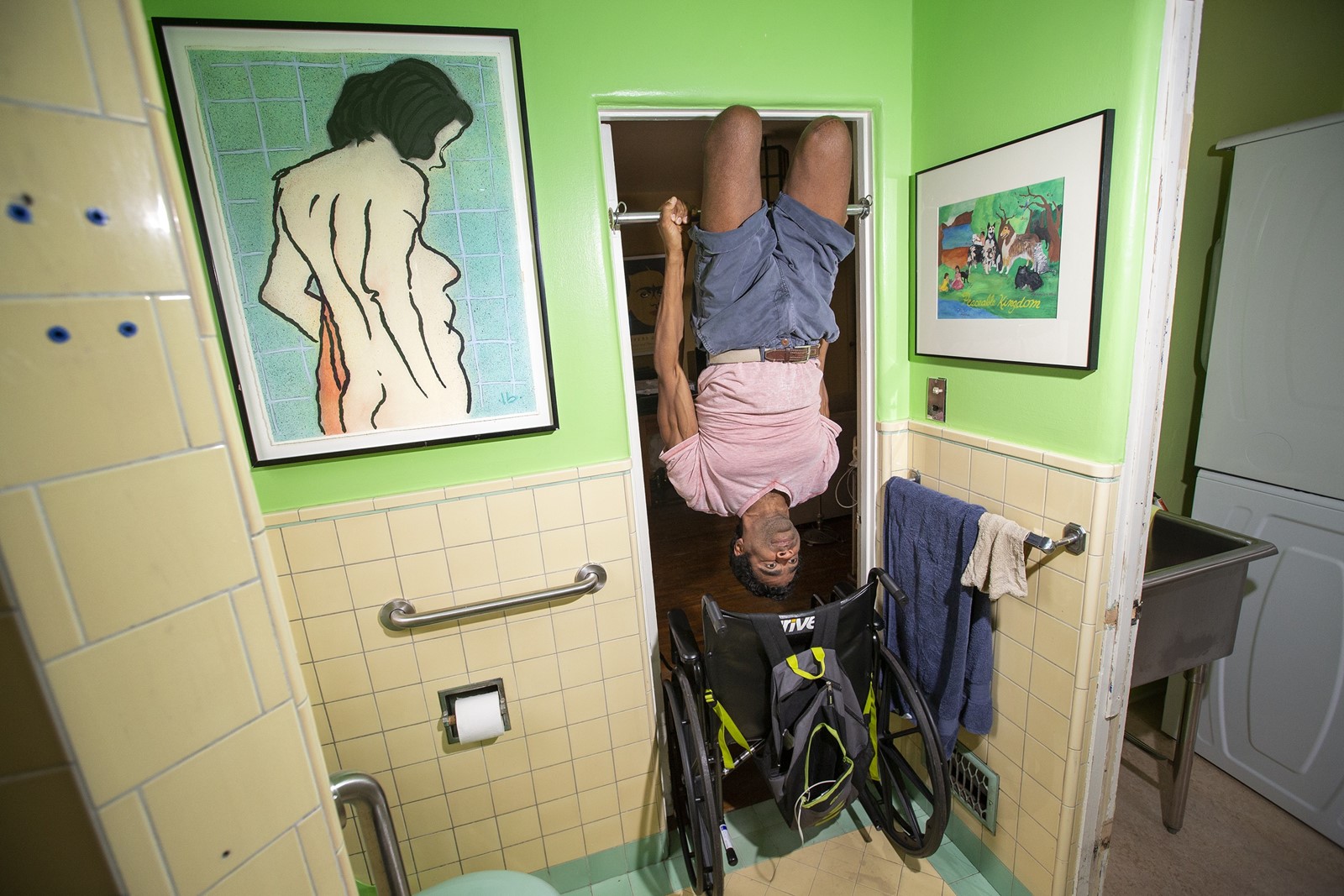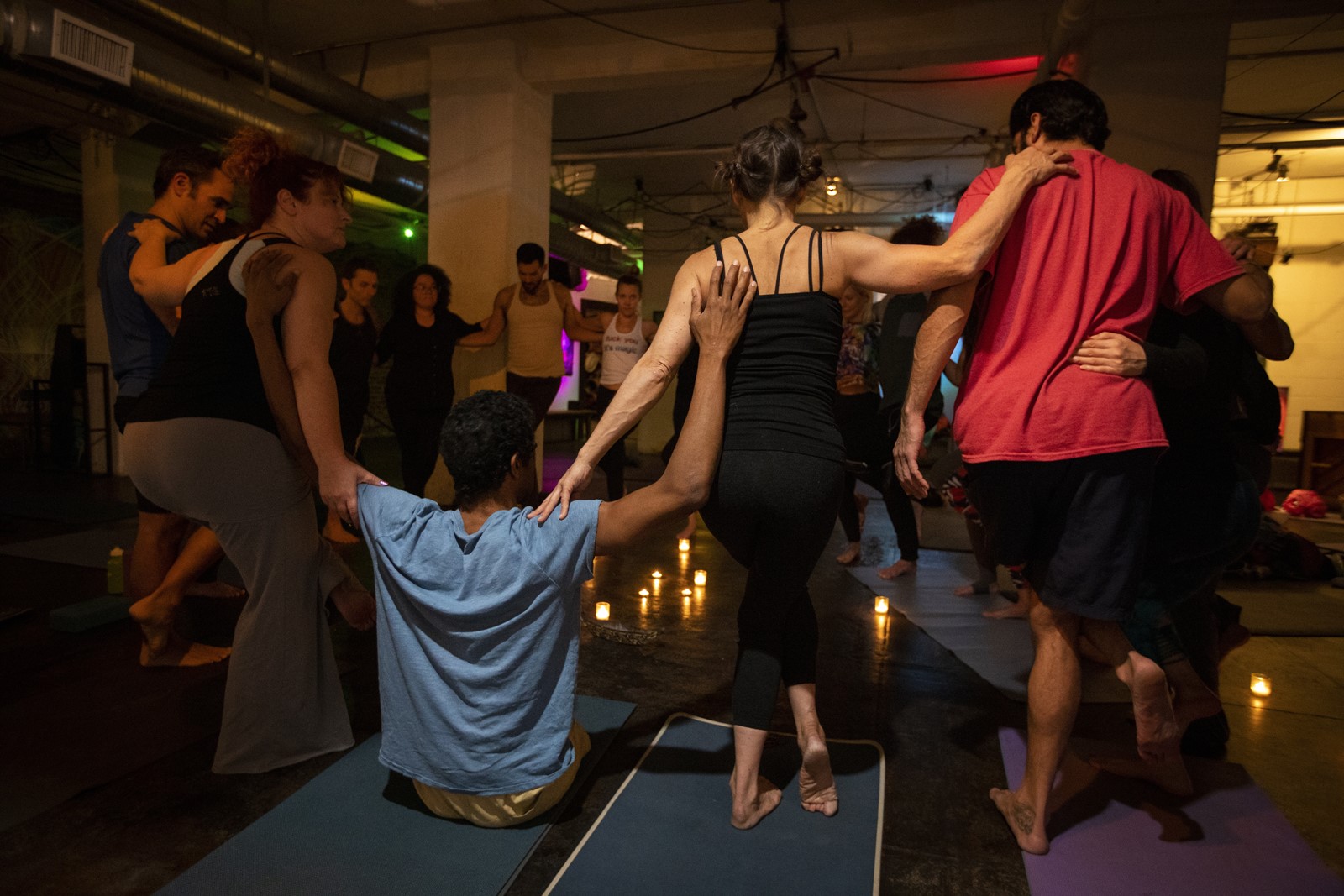CITY BEAT
A hit-and-run took his legs and nearly his life. Now, he has big plans to live it.


Obi, 47, is an actor, writer and yoga teacher and the founder of a nonprofit to foster the arts and societal wellness. He views compassion and kindness to others as central tenets of his life. He cares deeply about good health. He is a raw vegan who sustains his body on one colorful, protein-rich salad a day.
Late on the night of Saturday, Aug. 17, after teaching a class at Peace Yoga Gallery downtown, he stopped at Erewhon Market as he often did to forage for that daily meal.
He was loading his groceries from the natural foods store into a cooler in the trunk of his parked car when an SUV speeding down Beverly Boulevard veered out of its lane and slammed into him. Obi’s right leg was severed; his left hung on tenuously, by skin alone. The SUV’s driver reversed and raced off into the night.
And there was Obi in the street in the dark on his back, in a growing pool of blood that police said spread 8 feet.
A private chef driving home from a gig in Beverly Hills stayed with him, cradling his head and holding his hand. An orthopedic surgeon who rushed back to Cedars-Sinai after a long day to save Obi’s life had to amputate the left leg to do so.
You need to know about the violence. It’s at the center of this story. It divides Obi’s life before and after. But the violence isn’t the story, because Obi won’t let it be. I am telling you the ugly details of what happened to him in order to help you fully appreciate the beauty of his response.
Obi has always been highly athletic. He was introduced to yoga in a physical acting class at the Yale School of Drama. As an actor, he has loved action and scenes in which he’s done stunts. What he lost was devastating. He’d be the first to say so. Sometimes he calls the fact of the crash “insane.”
Still, how do you react in the face of previously unimaginable personal trauma? Obi does not see it as a choice. On the street, after he blacked out briefly and then came to, he remembers saying, “I’m alive, I’m alive, I’m alive, I’m alive.” And in so many ways, with growing wonder and gratitude, he’s been repeating it as his mantra in the 15 weeks since.
His surgeon, Dr. Milton Little, calls his survival “a miracle.” Miracle too that as the SUV smashed into him, he suffered no injuries elsewhere. But the biggest stunner possibly is the survivor himself, whom Little describes as “a light.”
“Him being in this situation is going to change many, many lives,” Little predicted.
Almost from the first moment, this has been Obi’s stated intention.
He has plunged right back into his life. He talks openly about his trauma. He does not fold in on himself, origami-like, to shy away from eyes.
On a GoFundMe page set up to raise money for prosthetic legs and uncovered costs and fixes to make his many-staired home in Silver Lake more accessible, he has posted videos of himself — starting just 36 days after the crash — going to the gym and doing yoga and working his upper body from his wheelchair.
The other night, I watched him teach part of a yoga class at the studio where he taught the night of the crash. He shops at Erewhon every other day at least, though he now Ubers and relies on the drivers to stow away and then take out his wheelchair. He doesn’t shun the scene of the crime. He won’t give it that power.
People keep telling him he’s exceptional, that they could never do what he is doing. That both makes him uncomfortable and gives him purpose. He prefers to see himself as everyone and anyone — anyone determined to survive and live fully.
And he wants others to learn his story and draw from it faith in their own inner strength and capacity to face whatever comes. It could be a store shooting or a hostage situation or an illness, he said.
“How do you know how you would handle this? How do you know what your own reserves are?” he tells me he thinks in response to the praise. “And anyway, what’s the alternative?”
I didn’t know Obi in that life before, though like a lot of people I probably saw him here and there, on a local stage or on “Dawson’s Creek” or “Star Trek: Deep Space Nine” or “Stargate SG-1” or maybe on an episode of “The West Wing.”
He’s shown me video clips, and when I see his long legs in motion I sometimes have to swallow a few times to hold back tears. But even as I look at him and at the stitches across the residual limbs that remain, I see wholeness because he is whole. Emotionally whole. Strong. Fully present. Frequently joyful.
“This is just so horrendous what happened to me, why would I compound this by feeling bad about it?” he told me the first time we met, at the outdoor tables at Erewhon, no more than 20 yards from the spot where he easily could have bled to death. “I didn’t even have to choose positivity,” he said, smiling the broad, generous smile that I’ve seen again and again since.
Generous, too, is his approach to the driver who hit him.
A 25-year-old man was arrested the day after the crash on suspicion of felony DUI causing injury. Soon after the crash, he had abandoned an SUV — whose front was badly damaged — in the middle of an intersection less than a mile away. A witness had seen him walk away, bloody. His vehicle matched descriptions of the one from the scene. The driver’s airbag had deployed and was bloody. TV news footage showed a pipe near the passenger seat. The young man had a broken nose. He posted bail and has not been charged. The district attorney’s office asked for further police investigation.
Obi says he feels no hate or even anger for the driver, “not one ounce.” If he did, he says, it would only prove self-destructive.
He can’t afford that negative energy as he wraps his head around his new identity as a bilateral above-knee amputee and learns to navigate the world in a wheelchair as he readies for prosthetic legs.
There are rough days, of course, quite a lot of them — including his first, very painful tries at walking with sample prosthetics. (He told me it felt like walking on his cheekbones.) At the yoga class I watched, he looked to me lonely and left out at times as others did poses that, at least for now, he no longer can. He was, Obi told me, but in a way he’s trained his whole life to handle such feelings.
He’s always been a highly sensitive, empathetic, emotional person, and along the way he’s learned the best ways to regulate. That’s where his particular eating regime comes in. He used to binge on sugar as a way to detach and numb out. Eventually he discovered what foods helped him function and feel better. He also long ago learned that he needs to cry often. So he cries a lot now.
“It’s just like, if you can imagine, a locomotive or a train, and in order for it to function you have to have these men shoveling coal. I have to shovel these tears out of me in order to make room,” he told me. To make room to feel more of his feelings.
And then he also has other tool kits, from acting and yoga. It’s like he’s now being asked to put all that talk of mindfulness and patience to the test.
“I couldn’t live in this world without becoming sort of like an Olympic athlete of certain things, you know — of kindness and of health — because there is no other choice for me,” he said. “So there’s a sort of rigor to me, and I think, ‘OK, my legs are severed. I don’t know how to do
Even Obi’s own mother, Susan Matranga, with whom he lives, says she’s been astounded by her son’s positive outlook. People noticed it right away at the hospital, she tells me. Something about his openness and grace pierced them, as if he were a bowl and they were eggs, tapping against him and cracking wide open.
They told him their own very personal stories. They confided their struggles. The former dancer with the Joffrey Ballet who became a nurse as his friends died of AIDS, the young surgeon who described how hard it was for her to feel seen and heard in work settings in which the leaders were men.
On the GoFundMe page, which has already raised more than $200,000 to help him through a very difficult and costly future, people from every stage of his life have told him how his efforts to push through his pain have also pushed them to do better in their own lives. Strangers have donated. So have his Uber drivers and his classmates at the Los Angeles Center for Enriched Studies and Yale. Bette Midler, who heard what he’d been through from a friend, gave him $10,000.
Obi hopes to hold on to and harness that attention. He has spent the last five years writing and pitching a TV show he co-created called “Juice Bar,” set in a more futuristic version of Erewhon — a place people crowd to in search of cures for all their ills. It gently and lovingly mocks that crunchy granola world he belongs to, but also subtly incorporates real ideas about better living.
Long before the crash, Obi wrote an episode featuring a paraplegic using a wheelchair who comes to a yoga class and puts others to shame when he relies on his upper body strength to do a series of poses including a handstand. Now he can see himself playing such roles and breaking barriers. He’s eager to get out there and convince people to let him do so. And to pick up more loose ends. Next week, for instance, he’ll return for the first time since the accident to the private school where in recent years he’s taught yoga to kids known as twice-exceptional, high ability but with learning and social challenges. Maybe now he’ll have new insights.
In his wheelchair, as he talks of his many plans for a rich future, he pushes up on the armrests and lifts his body shoulder height into the air, and it’s breathtaking.
He floats above. It almost looks like he’s levitating.


